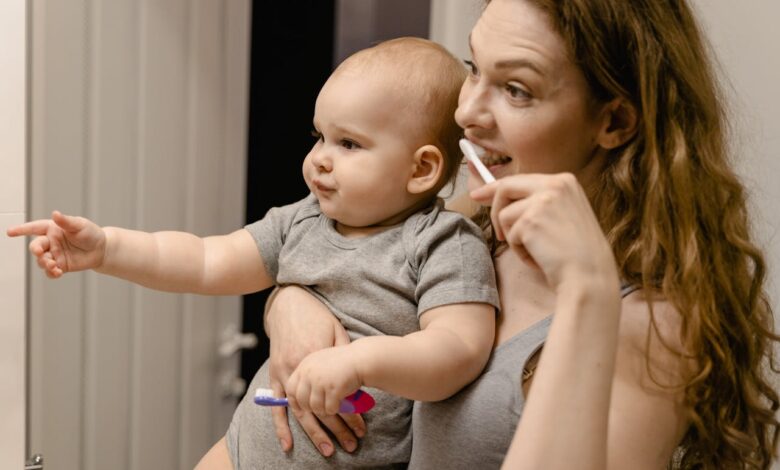When to Start Brushing Your Baby’s Teeth

Babies’ long-term dental health depends on a consistent mouth cleaning regimen. Many parents might not know when to start cleaning their infant’s teeth or how best to do so. Early dental care lays the groundwork for good habits as children grow and helps avoid cavities. Guidelines and best practices on when to begin brushing the infant’s teeth are offered on this page.
Start Before the Eruption of Teeth
Even before your baby’s first teeth show, oral hygiene should start. Following meals, the American Academy of Pediatric Dentistry advises mild, damp cloth washing of your baby’s gums. This habit helps eliminate food bits and microorganisms that could gather in the mouth. Additionally, helping your child grow used to the sensation of having their mouth cleaned is gently wiping the gums. Early establishment of this habit will help to smooth the change to brushing teeth once they start to erupt. To encourage proper dental hygiene from the beginning, parents should try to brush the gums at least twice a day—especially following evening meals. By cleaning the gums, one can also assist in avoiding the accumulation of dangerous germs, which might cause early dental problems, including infantile gingivitis. Starting early will help parents create a good connection with oral hygiene, therefore laying the basis for a lifetime of good dental practices.
Start Brushing When the First Tooth Erupts
Get a small, soft-bristled infant-oriented toothbrush. It will assist if you smear a tiny bit of fluoride toothpaste—about a grain of rice—on the brush. Move softly in a circular manner, cleaning the tooth and the surrounding gums. It is vital to brush at least twice every day—ideally earliest in the morning before breakfast and prior to bed. This schedule helps eradicate germs and plaque capable of causing cavities. As more teeth show up, brushing all surfaces of the teeth and gums will assist in maintaining good dental health. Usually, around three years old, parents should observe their child brush until they can do the task on their own. Beginning this early habit ensures that children grow up dedicated to keeping their teeth clean.
Transition to a Pea-Sized Amount of Toothpaste
You can use more toothpaste as your child develops and additional teeth erupt. By three years old, a pea-sized dose of fluoride toothpaste is advised. This dosage is enough to reduce the risk of ingesting too much toothpaste and yet offer the advantages of fluoride. Parents should keep watching brushing to make sure kids are applying the right technique and not swallowing toothpaste. Children’s tendency can be reinforced by instruction to spit out extra toothpaste following brushing. Your child’s dental health will be much improved by routinely brushing with the right toothpaste amount. As their teeth grow, this regimen, combined with the right toothpaste, helps guard against cavities and promotes general oral health.
Flossing as a Tooth-Touch Technique
Two teeth touching should mark the commencement of flossing. Usually, this starts at about two or three years old. Developing a schedule that calls for brushing and flossing will help ward against cavities and advance good gum development. Early on flossing instruction for children helps to inculcate lifelong healthy habits. Please encourage your child to floss on their own as they grow older, but keep watching to be sure they are using the right technique. They will progressively acquire the confidence and ability required to keep their oral health on their own, so flossing becomes a regular habit in their daily life.
Plan Frequent Dental Check-ups
Monitoring your child’s oral condition and guaranteeing appropriate dental growth depends on regular dentist visits. The dentist can evaluate your child’s dental condition, give expert cleanings, and provide direction on appropriate oral hygiene practices during these appointments. Establishing a schedule of dental check-ups with a pediatric dentist in Chula Vista if you reside there, can help youngsters grow at ease with the dentist and lower their worries about their next visits. Maintaining your child’s dental health and early on addressing any issues early depends on regular visits. Apart from regular visits, the dentist might also apply dental sealants or fluoride treatments to guard your child’s teeth against decay further. These appointments also give parents a chance to ask questions about their child’s nutrition, oral habits, and any issues so guaranteeing thorough dental treatment.
Conclusion
Promoting lifetime oral health depends on you beginning a dental care regimen for your infant. Parents can assist their children in creating good habits by starting oral hygiene before teeth erupt, brushing as soon as the first tooth shows up, changing to the proper toothpaste, adding flossing, and planning frequent dental visits. By acting early in dental care, your child’s chance of cavities will be much lowered, and their smile will be guaranteed.


